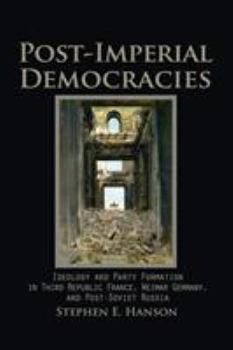Post-Imperial Democracies
(Part of the Cambridge Studies in Comparative Politics Series)
Select Format
Select Condition 
Book Overview
This book examines the causal impact of ideology through a comparative-historical analysis of three cases of "post-imperial democracy" the early Third Republic in France (1870-1886); the Weimar Republic in Germany (1918-1934); and post-Soviet Russia (1992-2008). Hanson argues that political ideologies are typically necessary for the mobilization of enduring, independent national party organizations in uncertain democracies. Clear and consistent ideologies can artificially elongate the temporal horizons of their adherents. By presenting an explicit and desirable picture of the political future, successful ideologues induce individuals to embrace a long-run strategy of cooperation with other converts. When enough new converts cooperate in this way, it enables sustained collective action to defend and extend party power. Successful party ideologies thus have the character of self-fulfilling prophecies: by portraying the future polity as one organized to serve the interests of those loyal to specific ideological principles, they help to bring political organizations centered on these principles into being.
Format:Paperback
Language:English
ISBN:0521709857
ISBN13:9780521709859
Release Date:September 2010
Publisher:Cambridge University Press
Length:306 Pages
Weight:0.98 lbs.
Dimensions:0.7" x 6.3" x 8.9"
Customer Reviews
0 rating





